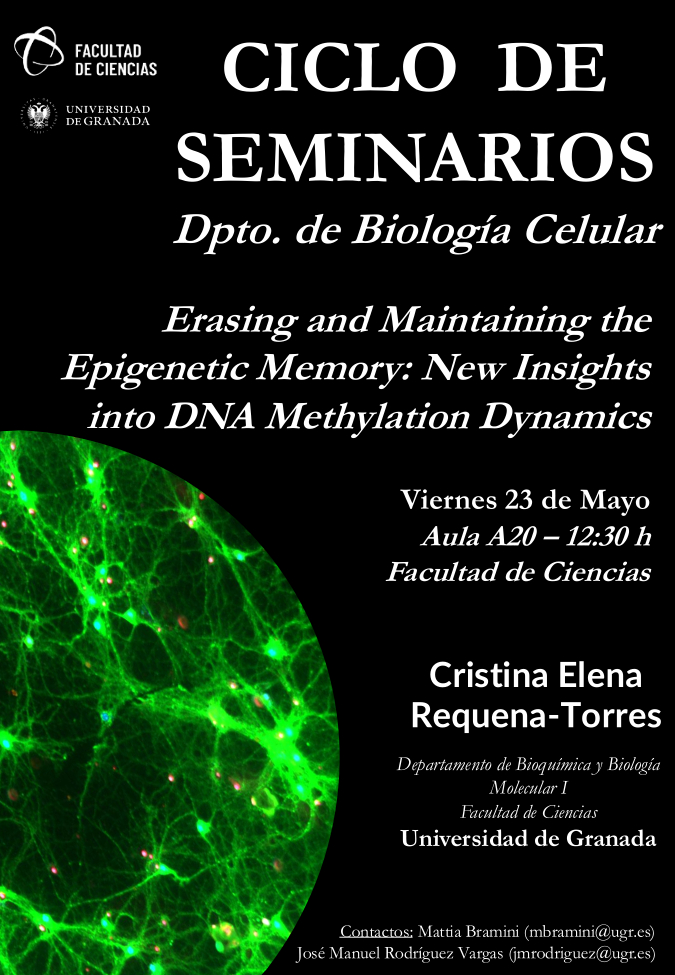Fecha: Viernes 23 de Mayo, 2025.
Hora: 12:30h.
Lugar: Aula A20 - Facultad de Ciencias (UGR).
Ponente: Cristina Requena, Departamento de Bioquímica y Biología Molecular I; Facultad de Ciencias, Universidad de Granada.
Summary
Epigenetic mechanisms are essential to allow the formation of gametes, the totipotent zygote, the subsequence cellular differentiation and finally to maintain cell identity in the developed organism. In the Stem Cell and Development field, understanding the epigenetic rewiring required to change the transcriptional landscape in these scenarios, remains a major challenge that arises from technical difficulties and the great complexity of the process. Methylation of cytosines (5mC) in particular, have a repressive function of gene expression. Resent advances have brought insights into the maintenance of this mark during cell division and how it is erased during the two mayor reprogramming events in development but still, many open questions remain. Intriguingly, these deep changes in the epigenetic patterns that occurs during the first steps in life, are linked to the generation of DNA damage, even though preserving genome integrity during embryonic development is extremely important to ensure embryo viability and avoid abnormalities after birth. This entails one of the biggest paradoxes in the field, and our research aims to reveal the underlying mechanisms that balance epigenetic reprogramming and genome stability during early development and stem cell differentiation using mouse models.
Bio
Cristina Requena is part of the REPRO-UGR research group within the Department of Biochemistry and Molecular Biology I, Faculty of Science, University of Granada. She started her career with a Ph.D. in Biochemistry and Molecular Biology from the University of Granada in 2014, doing her thesis at the Institute of Parasitology and Biomedicine López Neyra (Granada, Spain). She studied the importance of cellular nucleotide pool balance and DNA damage. In 2016, she moved to the London Institute of Medical Science, MRC/Imperial College London (London, UK) to continue her postdoctoral research. During these years she focused her career on Developmental Epigenetics and Stem Cell Biology. In 2022, she joined the University of Granada (Granada, Spain) as a senior researcher with a María Zambrano Junior Grant to attract international talent. In 2023, she was established as a principal investigator under the EMERGIA Program from the Regional Government of Andalusia (Junta de Andalucía), focusing her studies on DNA stability during epigenetic reprogramming events happening during development.
Dentro del Ciclo de Seminarios - Dpto. de Biologia Celular.
Contacto: Mattia Bramini y José Manuel Rodríguez Vargas.
Escribir un comentario
Información básica sobre protección de datos personales
Responsable: Universidad de Granada
Legitimación: La Universidad de Granada está legitimada para el tratamiento de sus datos, siendo de aplicación las bases jurídicas previstas en el art. 6.1 del RGPD que correspondan en función de la finalidad pretendida por usted en el formulario de contacto.
Finalidad: Gestionar su comunicación.
Destinatarios: No se prevén comunicaciones de datos, salvo que sea necesario para gestionar su solicitud.
Derechos: Tiene derecho a solicitar el acceso, oposición, rectificación, supresión o limitación del tratamiento de sus datos, tal y como se explica en la información adicional.
Información adicional: Puede consultar la información adicional y detallada sobre protección de datos, en función del tipo de tratamiento, en la UGR en el siguiente enlace





